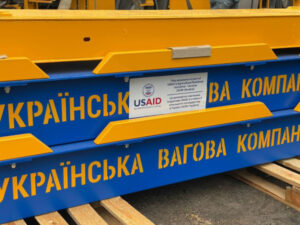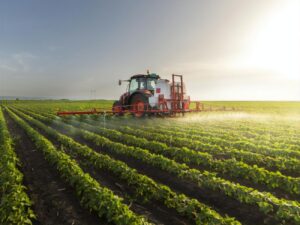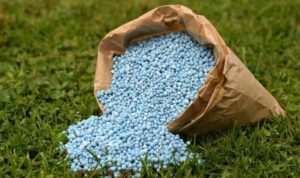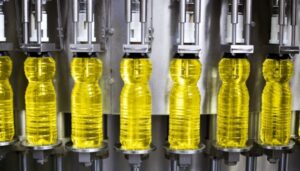
USAID’s Economic Support for Ukraine project has purchased weighing equipment for weighing railroad and road transport and transferred it to one of the largest operators in Ukraine’s grain market, JV Nibulon LLC (Mykolaiv), the grain trader’s press service reported.
“Providing Nibulon’s elevators with modern weighing equipment will speed up weighing of road and rail transport, provide automation and restore previously cut off capacity to the Izmail investment project. Thanks to this, we expect to restore the capacity of supply chains and speed up operations on acceptance and shipment of grain products. Additional weighing complexes will increase the turnover in conditions of increased load on land transportation”, – said the director on interaction with authorities and issues of sustainable development of “Nibulon” Mikhail Rizak.
According to the company, the weighing equipment will be used at four elevators of the company – in Mykolayiv, Poltava and Cherkasy regions.
With the beginning of Russia’s full-scale war against Ukraine, Nibulon was forced to reorient its export chains and compensate for the lack of river navigation on the international inland waterway E-40. The priority was the investment project of the river port in Izmail and strengthening the logistic potential of the company in the use of land routes, recalled the press service of the grain trader.
Currently, Nibulon uses combined routes that combine transportation by truck and transshipment by rail with subsequent transshipment to water transport in Izmail.
USAID’s assistance to agroexporters is part of the Agricultural Sustainability Initiative in Ukraine, which is implemented by the U.S. Agency for International Development. It aims to help Ukraine increase its capacity to produce, store, transport and export grain.
JV Nibulon LLC was established in 1991. Before the Russian military invasion, the grain trader had 27 transshipment terminals and complexes for receiving agricultural crops, capacity for one-time storage of 2.25 million tons of agricultural products, a fleet of 83 vessels (including 23 tugboats), and owned the Nikolaev shipyard.
“Nibulon” before the war cultivated 82 thousand hectares of land in 12 regions of Ukraine and exported agricultural products to more than 70 countries.
The grain trader exported the maximum 5.64 million tons of agricultural products in 2021, reaching record shipments to foreign markets in August – 0.7 million tons, in the fourth quarter – 1.88 million tons and in the second half of the year – 3.71 million tons.
Nibulon’s losses from the full-scale military invasion of the Russian Federation reached $400 mln. Currently, the grain trader is operating at 30% of its capacity, has created a special unit for demining agricultural land and started production of the first vessel for demining international waterways at its shipyards in Mykolayiv.
The grain trader recently raised EUR27m from the Danish Export Investment Fund (EIFO) to increase the capacity of the Bessarabsky branch in Izmail, where an elevator and a flour mill will be built.

U.S. Agency for International Development USAID Administrator Samantha Power condemned Russia’s decision to suspend participation in the “grain initiative” and announced $250 million in support for Ukraine’s agriculture sector, which has suffered as a result of Russia’s full-scale invasion, USAID said.
“The United States is providing this assistance because of its Agriculture Sustainability Initiative-Ukraine (AGRI-Ukraine). In total, the U.S. government has already directed $350 million to the initiative. The agency plans to engage the private sector, other donors and foundations to raise an additional $250 million,” the USAID press office quoted Power as saying during a visit to the Port of Odessa on Tuesday.
The additional funds will be used to expand critical agricultural infrastructure, including irrigation systems, grain elevators, transloading facilities, and port and border infrastructure.
In addition, USAID will expand support to small and medium-sized agricultural businesses so that they have access to financing and resources to plan for planting and harvesting in 2023.
The agency noted that the Russian full-scale invasion has caused more than $6.6 billion in direct damage to Ukraine’s agricultural sector.
“AGRI-Ukraine will continue to help Ukraine’s farmers produce, store, and export agricultural products and grain to the world,” USAID assured.
The AGRI-Ukraine initiative was launched in July 2022 and supports more than 30% of Ukraine’s registered farmers. Thus, the U.S. provides seeds, fertilizers, agricultural and financial services and storage.
Thanks to USAID support, farmers were able to store more than 843,000 tons of grain, and more than 600 farmers received nearly $49.8 million.
International companies such as Bayer, Grain Alliance, Kernel, and Nibulon are investing in programs to support Ukraine’s agricultural sector. The World Bank has also joined AGRI-Ukraine in financing reforms in the sector.

The US government, through the USAID AGRO Program, will provide Ukrainian agrarians with 12,000 tons of fertilizers for the autumn sowing season free of charge, the press service of the Ministry of Agrarian Policy and Food said.
“Before the war, Ukraine provided domestic needs for nitrogen fertilizers by 75%. However, due to the full-scale invasion, production has decreased due to logistical problems, broken production chains and rising costs of raw materials. This has limited access to fertilizer for micro, small, and medium-sized farmers. USAID will help agribusinesses ensure their farms have the fertilizer they need in the fall and continue next year,” the statement said.
Agrarians who cultivate from 5 to 500 hectares in any region of Ukraine (except for temporarily occupied territories), grow grain or oilseed crops, are registered as legal entities or individual entrepreneurs, in particular, family farms, will be able to participate in the program.
They will be able to receive 1 ton of nitroammophoska (NPK 16:16:16:16/15:15:15:15) for main and pre-sowing application.
Registration for assistance has already started in the State Agrarian Register (SAR). Applications are accepted exclusively through the GAR, under “Available Programs” – “NPK Fertilizer from USAID AGRO, 2023.” Registration will continue until the applied amount of fertilizer is exhausted.
The USAID AGRO program will hold a public webinar on July 20, 2023 on the terms and conditions and receiving assistance.
As reported, USAID launched a number of programs in 2022 to address the global food crisis, which is exacerbated by the war waged against Ukraine. In the spring of 2023, more than 8,200 Ukrainian agrarians received more than 6,300 tons of fertilizers from USAID, as well as seeds for sowing more than 48,300 hectares of sunflower and 15,000 hectares of corn.

The USAID Competitive Economy of Ukraine program announced a grant program to create and support associations of businesses into export alliances with a total funding of $1.5 million, the Economy Ministry press service said Friday.
“Grant support for export alliances will strengthen the potential of Ukrainian enterprises and encourage them to unite for common goals of conquering new markets,” USAID project manager Natalya Petrova said in a statement.
The program offers about 15 grants, ranging from $35,000 to $150,000. Applications will be accepted till September 30, 2023. Given the considerable interest, reception and consideration of applications will be held in stages on June 30 and September 30, 2023.
The Ministry of Economy added that the goal of the grant program is to support businesses seeking to jointly promote their products in international markets. The initiative is implemented in partnership with the Office for Entrepreneurship and Export Development and the national project “Dia.Biznes”.
As the press service specified, the priority sectors for grant support are information technology, engineering, manufacturing, and creative industries and services. However, this USAID program is open to applications to support other sectors that meet the selection criteria.
The USAID Competitive Economy of Ukraine (CEU) program supports start-ups and small to medium-sized enterprises (SMEs) to increase their competitiveness in Ukraine’s domestic market and in international markets, assists in the development of a simplified and transparent business climate, and provides opportunities for Ukrainian companies to take advantage of international trade. A key instrument for implementing the USAID QEU program is the $12.5 million grant program at the national scale for 2018-2023.

The USAID Agro program will allocate UAH 367 million to co-finance projects to support processing of grains, oilseeds and pulses in Ukraine, the press service of the Ministry of Agrarian Policy reported.
“This will create the potential for the production of products with added value and ensure the expansion of channels and markets. Consequently, qualitatively and quantitatively improve the food security of Ukraine and the world,” the report stresses.
According to USAID, the goal of the project is to improve small agricultural producers’ access to capacities for processing and refining grains, oilseeds and pulses into food, feed, industrial products and biofuel.
As it is specified, it is planned to allocate up to 367 million hryvnia within 20 projects with the term of realization up to two years. It is assumed that the amount of each sub-grant will be from 10 to 36 million UAH and will be discussed individually.
“It is expected that under the projects executors – Ukrainian entities – will provide MSME with expert, technical and financial support to expand the processing of grain, oilseeds and pulses. Activities will be aimed primarily at expanding existing processing facilities, which will lead to increased production of higher value-added cereal products for domestic consumption and export,” the report summarizes.

The risks of investing in Ukraine are already lower than at the beginning of the war and the opportunities are higher, the first foreign investors such as Kingspan, Nestle and Bayer are already investing in the country and American businesses should follow their lead and benefit while they will have government support, USAID Administrator Samantha Power said.
“By investing in Ukraine, you can join companies like Kingspan, Nestle, and Bayer who are pioneering, you can invest in the future of Ukraine, and in doing so, you will be investing in the future of democracy. Know that USAID and our partners around the world plan to provide full support,” she said at the Ukraine-U.S. Partnership Forum hosted by the American Chambers of Commerce of the two countries in Washington, D.C. on Thursday.
Power said Ireland’s Kingspan group recently announced a $200 million investment to build a technology campus in Lviv that will employ 600-800 people, Nestle is investing nearly $43 million in a new food processing facility that will add 1,500 new jobs and Bayer is investing over $65 million to expand its corn seed plant, new warehouses and bomb shelters to protect employees.
She added that even during the war Ukraine has expanded its leadership in advanced industries such as artificial intelligence, fintech and blockchain, and in 2022 the IT industry brought more than $7 billion to the Ukrainian economy – 20% more than the year before.
The head of USAID stressed that the U.S. government is willing to work with businesses to reduce risks and try to remove barriers to investing in Ukraine as much as possible. “We are investing heavily in partnerships with the Ukrainian government, other democracies, and multilateral institutions to reduce the cost of doing business in Ukraine,” she said, citing assistance with restoring energy supplies and supplying seeds and fertilizer to Ukrainian farmers.
Speaking about removing barriers that still hinder investment, Power said a survey of 122 U.S.-Ukraine-related Chamber of Commerce companies, U.S. investors, international organizations and economic experts was conducted and eight areas of reform were identified.
“And now we’re taking this crowdsourced program of reforms and working with the Ukrainian government to help ensure they’re implemented,” the USAID chief added, citing among them increased transparency, increased judicial independence, and risk insurance.
“Now I know that you are all well aware of the potential benefits of being an early investor in an economy ready for substantial growth, ready for much deeper integration with European neighbors in the years ahead,” Power summed up.
And she also noted that a contribution to Ukraine’s economy now is a contribution to winning the war, a bet on values that are cherished in America.